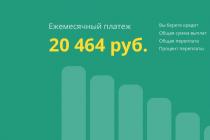Alimony debt occurs when the debtor does not pay them on time. The frequency of payment of alimony is determined either by the court or by agreement of the parties. Today, very strict measures are applied to alimony debtors.
Dear readers! The article talks about typical ways to solve legal issues, but each case is individual. If you want to know how solve exactly your problem- contact a consultant:
APPLICATIONS AND CALLS ARE ACCEPTED 24/7 and 7 days a week.
It's fast and FOR FREE!
Legislation
This section specifies the procedure and methods for collecting alimony from:
- parents;
- children;
- former spouses;
- other relatives.
Alimony can be collected voluntarily, that is, under a settlement agreement, or in a forced manner, that is, by a court decision.
Reasons for the formation of debt
There are two reasons for non-payment:
- respectful;
- disrespectful.
The court recognizes the reason as valid, which arose through no fault of the payer.
For example, if the alimony debt was formed due to the fact that the debtor was in the hospital for a long time and could not make payments. The court will consider such a reason as valid if the debtor presents evidence, that is, an extract from the hospital.
If the debt was formed because the debtor went on vacation and did not take care to pay the required amount in advance. That is not a good reason.
The court imposes severe sanctions on alimony debtors - they cannot fly abroad or take a loan.
If the alimony debt was formed for a good reason, then the court will make a decision, and such a debtor will be removed from the “black lists” for the time allotted by the court. During this time, he will have to pay off the debt.
How to collect
Child support recipients are worried about the question of what to do to collect the debt?
This can be done through the bailiffs or contact the police.
But, neither one nor the other method will be effective if the applicant does not take matters into his own hands and help the state authorities.
Through bailiffs
If the applicant decides to apply to the bailiff service, he must be prepared for the fact that the case will move very slowly.
But first you need to write a statement in which you need to indicate:
- your full name;
- Name of the person in whose favor the alimony is collected;
- indicate the document on the basis of which this occurs;
- indicate the date from which the debt was formed.
In order for the case to start moving, you need to inform the bailiffs:
- the place of residence of the debtor;
- about his property;
- about his property.
If the whereabouts of the debtor is unknown, the bailiffs must put him on the wanted list.
If the bailiffs do not take any action to search for the debtor and collect alimony, the applicant can write a statement to the prosecutor's office complaining about the inaction of the bailiffs.
Contacting the police
Liberation
You can get exemption from paying alimony only by a court decision, or when certain circumstances occur. The court may issue a ruling on the full or partial removal of the obligation to pay alimony, if the court considers the reasons for non-payment to be valid.
Questions
Both payers and recipients of alimony have a lot of questions about the collection and payment of alimony and debts on them.
idle
A non-working father is not relieved of the obligation to support his children.
Alimony will be paid in a fixed amount of money.
If a debt arises, then the arrest will be imposed on his property. If he cannot pay the debt, he will be forced to work.
Actions of bailiffs
Having received a writ of execution for the collection of alimony arrears, the bailiff issues a decision to initiate enforcement proceedings.
He sends a copy of this decision to:
- debtor;
- recipient
- to the authority that issued the writ of execution.
And then it begins to send the necessary requests to collect the necessary information.
After the death of the debtor
With the death of the debtor, maintenance obligations cease. This is said
But the debt on alimony passes in the order of inheritance.
Formed through the fault of the organization
In accordance with Article 6.1 of the Federal Law of October 2, 2007 No. 229-FZ “On Enforcement Proceedings”, the Federal Bailiff Service creates and maintains a database of enforcement proceedings in electronic form. In accordance with the public part of the Data Bank is published on the official website of the FSSP of Russia.
The information specified in Part 3 of Article 6.1 of 02.10.2007 No. 229-FZ “On Enforcement Proceedings” is publicly available until the day the enforcement proceedings are completed or terminated, with the exception of information about the return of the writ of execution to the recoverer on the grounds provided for in paragraphs 3 and 4 of Part 1 Article 46 of the Federal Law, or on the termination of enforcement proceedings on the grounds provided for in paragraphs 6 and 7 of Part 1 of Article 47 of the Federal Law, which are publicly available for three years from the date of completion of enforcement proceedings.
According to Part 3 of Article 6.1 of Federal Law No. 229-FZ of 02.10.2007 “On Enforcement Proceedings”, the requirements contained in executive documents issued on the basis of a judicial act, the text of which, in accordance with the legislation of the Russian Federation, is not subject to placement on the Internet.
To work with the bank, you need to select a subsection - search for individuals, or search for legal entities. The section "Territorial authorities" indicates the region of official registration of an individual, the place of residence or location of his property, the place of registration with the IFTS of a legal entity, the location of his property or the address of his representative office or branch (for example, Altai Territory).
In accordance with Article 33 of the Federal Law of 02.10.2007 No. 229-FZ “On Enforcement Proceedings”, enforcement proceedings may be transferred to another division of bailiffs. By decision of the Director of the Federal Bailiff Service - Chief Bailiff of the Russian Federation, enforcement proceedings may be transferred to the Office for the Execution of Particularly Important Enforcement Proceedings. In this case: in the section "Territorial authorities" it is indicated - the Department for the execution of particularly important enforcement proceedings.
The date of birth for an individual is not mandatory. If the data matches, for more accurate identification, you can fill in the field in the format DD.MM.YYYY.
If you have information about the number of enforcement proceedings, you can obtain information from the database of enforcement proceedings through the "Search by the number of enforcement proceedings" section.
If you have information about the number of the executive document, you can get information from the data bank of enforcement proceedings through the "Search by the number of the executive document" section.
The FSSP of Russia does not store or transfer to third parties personal data entered by users in the search form.
The service "Data Bank of Enforcement Proceedings" is provided only on the official website of the FSSP of Russia at http:// and sections of the territorial bodies of the FSSP of Russia located in third-level domains r ** ..
using the service Data Bank of enforcement proceedings on the official website of the Federal Bailiff Service of Russia online through the electronic payment systems of Promsvyazbank, QIWI (no commission), Tinkoff (no commission), ROBOKASSA, PAYMENTSUSLUG.RU, WebMoney, Yandex.Money, PAYMO, Sist emy City, RFI Bank. The payment system OPLATAGOSERVICE.RU also allows you to pay the debt from your mobile phone account and through Euroset stores, the Yandex.Money payment system through mobile phone stores;
using the FSSP application for mobile devices online through electronic payment systems;
through a personal account in the Internet bank Sberbank Online @ yn by choosing the service "FSSP of Russia" (for users of bank cards of Sberbank of Russia);
through terminals and ATMs of instant payment;
using the service Data Bank of Enforcement Proceedings on the official website of the Federal Bailiff Service of Russia, print a receipt for payment and pay directly at the bank.
The entry in the Data Bank will be deleted or changed (in case of partial repayment of the debt) within 3-7 days from the date of payment, since the funds must be received on the deposit account of the bailiff department, distributed, transferred to the claimant.
If you have additional questions, you can contact the bailiff unit directly at the specified address, phone number in order to obtain information about the receipt of funds or about the measures taken and possible enforcement measures, such as, for example, a temporary restriction on travel outside the Russian Federation.
To clarify the nature and basis of the decisions taken on the collection of administrative fines and tax payments, the Federal Bailiff Service of Russia suggests contacting the authorized body that made the relevant decision, or obtain information on the official website of the State Traffic Inspectorate of the Ministry of Internal Affairs of Russia, or the Federal Tax Service.
You can get information about the course of enforcement proceedings by contacting the Unified Portal of Public Services at: https://www.gosuslugi.ru/structure/10000001012
Users of the VKontakte and Odnoklassniki social networks have the opportunity to obtain information about the presence/absence of debt through a special application called the Enforcement Proceedings Data Bank.
You can also get information about the presence / absence of debt from mobile devices using the following portable operating systems: Android, iOS and Windows Phone. The application is easy to find and install on the appropriate systems from the Windows app stores on Windows Phone, from Google Play on Android, from the App Store on iOS by typing “fssp” in the search.
Applications for social networks and mobile devices allow not only to receive information about the presence / absence of debts in enforcement proceedings once, but also to subscribe to receive this information constantly. By subscribing, you will receive notifications about the appearance of a new debt or about changes in an existing one.
According to statistics, only two-thirds of the Russians on whom they are assigned can boast of conscientious fulfillment of maintenance obligations. The rest either pay maintenance for children irregularly, or evade this obligation altogether. In the second case, the shortfall in the receipt by the children of the funds laid down by law remains on the conscience of would-be fathers.
But there are also cases when alimony payments are delayed due to circumstances beyond the control of the payer, or he does not have the opportunity to send the amount specified in the court decision on the same day. For such citizens, the state has provided a number of ways to find out alimony arrears, so that the lack of information on this issue is not a reason for shirking payments.
Dear readers! Our articles talk about typical ways to resolve legal issues, but each case is unique.
If you want to know how to solve exactly your problem - contact the online consultant form on the right or call the numbers below. It's fast and free!
Exists State Data Bank of Enforcement Proceedings, which records and constantly updates information on all subjects of enforcement proceedings in the country. It functions in accordance with the provisions of paragraph 3 of Art. 6.1. Federal Law "On Enforcement Proceedings".
The Data Bank of Enforcement Proceedings receives information about both individuals and legal entities. It can be considered a kind of "board of shame" for those who evade the executive duties imposed by the court - both alimony and any other.
When the debt is fully covered, the record about the payer is deleted from the Data Bank or corrected (in case the debt is not fully repaid). Information that does not correspond to reality does not fall into it - the record about the debtor contains brief information about the enforcement proceedings, as a result of which financial obligations were assigned:
- number and date of initiation of the court case;
- details of the court order;
- subject of execution (briefly);
- the amount of debt;
- the name of the bailiff and the name of the department.
Access to the Data Bank of enforcement proceedings is carried out in two ways:
- through the official website of the Federal Bailiff Service (FSPP);
- through the Unified Portal of Public Services (EPGU).

The address of the official website of the FSPP is fssprus.ru. To search for information, registration is not required - just go to the main page of the site and enter data for the search. The search is carried out according to the following parameters:
- the region in which the enforcement proceedings were carried out (territorial authorities);
- surname of the debtor;
- surname;
- Date of Birth.
The last two parameters are optional for entering into the search form, but knowing them greatly simplifies the search in the Data Bank. After pressing the button "Find" a list of results based on the entered data is displayed. According to him, focusing on the case number, details of the court order, etc. you should look for a record of the debtor.
In one of the fields, you can view the current amount of the debt, and in some cases even pay it directly through the Data Bank (if the bank where the alimony recipient has an account supports certain online payment services).
When searching for child support debt, you must not forget to select the tab "Search by individuals", since legal entities cannot, of course, pay alimony.
Unified portal of public services
To find out the alimony debt through EPGU (www.gosuslugi.ru), you need register on this portal. The procedure is elementary - you need to enter only the first name, last name and email address or mobile phone number (optional). After registration, the user moves to a personal account.
Next, through the main page, you need to go to the link called "Authorities". From the entire list of organs, one should single out Federal bailiff service. The site will display a list of services provided by the department, from which you need to select the tab "Provision of information on ongoing production".
Further, the mechanism is the same as when searching through the FSPP - enter payer details, but in addition, you need to specify a username and password in EPGU. Searching the Data Bank through the FSPP and EPGU is completely free.
Online applications in social networks
Active users of social networks can find out the amount of debt even through Odnoklassniki and In contact with. Both social networks download the application "Data Bank of Enforcement Proceedings", through which you can subscribe to a regular update of information about the amount of alimony arrears.

With the app, you can get:
- notices of the accrual of another debt;
- notifications of changes in the current debt (with full or partial repayment of the amount).
Alimony arrears calculation mechanism
Alimony payments arrears are calculated based on the provisions of Art. 102 FZ "On Enforcement Proceedings" and Art. 113 of the RF IC "Determination of alimony debt". Exists three types of calculation, each of which is determined by the nature of cash deductions:
- by the cost of living;
- based on the income of the executor of maintenance obligations;
- based on the indicator of the minimum wage (minimum wage) in the state.
According to the cost of living
The first method is applied when the alimony payer has . The basis for the calculation is the subsistence minimum (PM) for the region. The amount of the payment is indicated in the court decision as a multiple of the subsistence minimum - for example, 0.75 PM.
Since the cost of living changes quarterly, the debt is recalculated in accordance with its indicators. If payments have not been made, for example, for six months, then the indicator for the last quarter is used in the formula for calculating the debt.
Example: Since February 2015, a resident of the Perm region, citizen K., has been assigned monthly maintenance obligations in the form of a payment of 0.75 of the subsistence minimum by the decision of the district court. The citizen did not transfer alimony even once, as a result of which, by July, a debt had formed:
0.75 (payout index) x 8730 rubles (living wage in the Perm region) x 6 (number of months) = 39,285 rubles.

The second method is used in the presence of official sources of income. The share of income that is the amount of maintenance payments, determined by a court order or signed by the payer and the recipient. According to the provisions of Art. 81 of the RF IC, the amount of alimony is calculated in shares:
- on - up to 1/4 of income;
- on - up to 1/3 of income;
- for 3 or more children - up to 1/2 of income.
When calculating the debt, a 13% deduction is taken into account - personal income tax (PIT).
Example: Citizen M. is obliged to pay monthly alimony for the maintenance of two children in the amount of 1/3 of the documented monthly income, which is 45,000 rubles. The debt period is 6 months.
First, the amount is calculated on the basis of which the debt is calculated: 45,000 - 13% \u003d 39,150 rubles.
1/3 x 39 150 x 6 \u003d 78 300 rubles.
Based on the minimum wage
The third method is used in cases where the alimony payer works unofficially. Based on the average salary in the region and the statutory share of earnings.
Example: Citizen Y. has a permanent place of work, but does not want to provide information about his salary. The debt period is 11 months, while the citizen is obliged to pay maintenance for three children:
1/2 x 36,000 (average salary in the region) x 11 = 198,000 rubles.

Ignoring maintenance obligations 2 types of responsibility:
- Civil Law, which consists in the calculation of penalties for each overdue day of payment. The penalty is 0.5% of the total debt.
- Criminal, according to the provisions of art. 157 of the Criminal Code of the Russian Federation, which provides for the application of the following measures to non-payers:
- arrest for up to 3 months;
- appointment of compulsory works for up to 180 hours;
- appointment of corrective labor for up to 12 months.
Criminal liability is assigned if the person performing maintenance duties is qualified as a malicious non-payer.
Qualifying signs of "malice" can be the following factors:
- the payer is wanted for reasons of evading maintenance obligations;
- has not paid child support for more than 4 months;
- hides real income.
Malicious evasion of maintenance obligations can become.
Plus, due to the large number of alimony debts, liability can be even tougher. About this video:
Possibility of exemption from maintenance debt
There are also factors that allow the debtor to petition the court for the full or partial cancellation of alimony arrears. These may become alimony's illness or extremely difficult financial situation. The full list of reasons is given in Art. 114 RF IC.
At the same time, the debtor is obliged to provide sufficient and convincing evidence of his impossibility to fulfill maintenance obligations: medical certificates, acts of representatives of authorized bodies, etc.
In case of ignoring the rules of Russian legislation on the maintenance of minor children after a divorce, alimony debts automatically increase.
Dear readers! The article talks about typical ways to solve legal issues, but each case is individual. If you want to know how solve exactly your problem- contact a consultant:
APPLICATIONS AND CALLS ARE ACCEPTED 24/7 and 7 days a week.
It's fast and FOR FREE!
Knowing how to find out alimony arrears in 2019, you can eliminate the likelihood of various misunderstandings.
All parents, without exception, undertake to support their minor children until they reach the age of 18.
In the event of a divorce, the funds in the form of alimony payments are necessarily transferred to the bank account of the parent with whom the child remained to live.
In most cases, the defendants often ignore the requirements of Russian law and are in no hurry to pay off the alimony arrears.
For example, they do not live at the place of their registration and hide the place of their official employment, including ignoring phone calls.
General information
Alimony is money that is payable for the maintenance of children in the event of non-residence, in particular due to an official divorce.
By agreement of the parties, they can have both material and natural form. Financial assistance can be paid:
Under the natural form is meant the transfer to the ownership of the child of any expensive thing, property. For example, real estate.
The reasons for its occurrence
Based on the data that were obtained in the course of many years of judicial practice, there are several main reasons for the formation of debt obligations for, in particular:
| Various intentional actions of the debtor | Who tries by all means to hide the amount of personal income and possessions in property - the section additionally includes ignoring the need to notify the fact of a change in place of permanent residence, official employment |
| Various actions of undetermined power | Which can be expressed in diseases of the debtor or a difficult financial situation - it becomes necessary to form supporting documentation |
| Actions or omissions of the direct claimant | Which may be expressed in the failure to provide information regarding accounts and details for the purpose of further transfers |
| The error of the employees of the accounting department of that employer | To whom is officially the defendant in the pending case of alimony. In most cases, we can talk about unreliable calculations that significantly underestimate the actual amount |
As a result of such actions, an even greater debt is formed, which further negatively affects the debtor himself.



Limitation period
If it is necessary to collect a huge debt on alimony payments, the limitation period is not taken into account.
This means that you can apply to the judicial authority with the appropriate statement of claim at any time in the matter of:
- forfeit charges;
- forced collection;
- imposition on the property of the debtor.
It is customary to refer to the mandatory rules as the need to have a court decision on the issue of establishing obligations to collect maintenance payments.
It is extremely important to file this type of claim before the child reaches the age of majority, and it is imperative to establish the period from which the fact of retention begins - no more than 3 years.
After the age of 18, they continue to grow if the child continues to study on a full-time basis.
In the case of an official establishment, the requirements of the direct collector will be controlled by the bailiffs, who are the executors.
For your information - if the child is 18 years old, and the alimony debt remains - you can recover for the last 3 years (the statute of limitations).
In addition, it is necessary to pay attention to the fact that if the debt is gradually paid off, then the limitation period starts counting again from the moment of the last payment.
Current regulatory framework
The procedure for other types of calculations, including the rules for determining mandatory amounts, are regulated by such regulatory documents as:
- - regulates the order of enforcement proceedings.
This list is not exhaustive, but at the same time it details the key aspects on the issue of accrual, payment and formation of debts for children.
How to check child support debt
The procedure for checking debts for maintenance payments does not entail any difficulties if you know the mechanism of action.
At the same time, it is necessary to pay attention to other features, which may include:
- formation of a penalty;
- the rules for determining the principal amount;
- and so on.
For this reason, it is advisable to familiarize yourself with each nuance separately.
Formation of a penalty
The main criteria for the recovery of a penalty are considered to be:
In this case, it is quite advisable to file an appropriate statement of claim regarding an attempt to recover a penalty from an unscrupulous payer after the first delay:
- this does not entail the receipt of income to the direct claimant, since the fine is small;
- claims of this kind are often frivolous.
It will be most optimal to demand a penalty after the delay / delay in payment, starting after the fourth month. This is not taking into account the absence of such instructions in Russian legislation.
It is possible to demand a penalty for alimony payments from an unscrupulous payer only if there are certain factors and in such order as:
The rules for calculating the penalty under the legislation of the Russian Federation directly depend on the method by which alimony payments are established:
In case of overestimation of the amount of the penalty or an unreliable calculation, the judicial authority reserves the right to recalculate.
In this case, the judicial authority does not need to form an application for the calculation of alimony.
Rules for calculating the total amount
In practice, debt obligations for alimony are subject to recalculation on a regular basis, which is why the Resolution can be issued no more than once a quarter on a cumulative basis.
For example, at the time of the adoption of the relevant Decree in December 2017, it is set on the basis of the indicators of the average wage in the country for this period.
If during the past time the debt has not been repaid properly, then, for example, when calculating debt obligations in April 2019, bailiffs should take into account in Russia at this time.
If the debtors are engaged in entrepreneurial activities, then the bailiffs without fail require the submission of a tax return, on the basis of the specified information, in which the debt is calculated.
If a private entrepreneur uses a simplified taxation regime, the executive service is obliged to focus on the primary documentation of the available financial statements, in particular:
- and so on.
Upon receipt of a refusal to provide primary documentation, authorized persons of the state body reserve the right to make a calculation based on the indicators of the average wage in the country.
If violations of the interests of any party are identified, it has the legal right to apply to the court with an appropriate application to establish the amount of debt in a fixed amount.
Video: child support debt. criminal liability
This amount is subject to calculation and fixation by the judicial authority, taking into account the possible preservation of the existing level of financial support for the participants in the meeting and various other conditions.
In the case of forced collection of a debt, the bailiffs can take drastic measures - up to the arrest of settlement accounts and other property.
Where can I see the amount of debt online by last name
The mechanism of action when searching or checking the existing amount of debt using the official website of the FSSP using the Rosdolg service is as follows:
After the formation of the corresponding request, a table appears on the monitor screen with such information as:
- personal data about the debtor - full initials, date of birth, place of permanent registration;
- assigned number and date of formation of enforcement proceedings;
- detailed details of the executive documentation, on the basis of which the proceedings were initiated;
- the amount of debt obligations - the data of interest that were the subject of the search;
- the name of the bailiff department, as well as its full initials and current contact information.
How to collect the debt forcibly decide bailiffs, depending on the behavior of the debtor.
Collection procedure
Initially, you need to remember that collecting debt on your own rarely ends positively, which is why it is recommended to seek help from specialists.
With a possible attempt to collect debts on your own, the mechanism of action is as follows:
| Initially, you need to contact the territorial representation of bailiffs | With a statement in the prescribed form. If a settlement agreement is signed, but the other party does not fulfill its obligations, you should not worry about anything. It is its presence that is the basis for taking the necessary measures to enforce the debt collection and is equated to a court decision. Additionally, you need to attach to it:
|
| Based on the appeal, the bailiffs undertake the obligation to establish | And determining the amount of property and income of the debtor. In most cases, this includes:
|
According to the legislation of the Russian Federation, bailiffs must take all necessary operational measures to collect debts as soon as possible in the first few months.



How to write an application to the bailiffs (sample)
First of all, the alimony claimant must apply to the bailiff conducting the enforcement proceedings with a request to take all possible measures against the debtor to induce him to pay the debt, namely:
When visiting the bailiff, the recoverer must notify him of the existence of the resulting debt, and, if necessary, leave a written request for the application of measures to the non-payer. You can download a sample application from
In the event of malicious non-payment, the debtor may first be subject to penalties, and then imprisonment.
Let's take a closer look at what can lead to such a situation:
Attraction to it occurs in several stages:
| Identification of debt obligations | The amount of which is considered significant for the claimant. After that, the applicant requests the bailiff to calculate the debt and send the debtor a demand to pay the debt under the threat of criminal |
| If the debtor fails to act within six months | The applicant repeatedly performs the sequence of actions established by the previous paragraph. There is no need to do anything further, unless, as an interim measure, seize the property of the debtor |
| In case of repeated inaction of the defendant in enforcement proceedings, the bailiff | Obliged to issue a report on the discovery of signs of a crime. In this regard, all materials related to the debt are sent to the department of internal affairs for investigation. |
During the period of consideration of criminal proceedings, the applicant has the legal right to form a claim, which includes:
- forfeit;
- compulsory collection of immovable and movable property of a person who will already be in the status of a defendant.
This nuance must be remembered to eliminate the likelihood of a refusal.
When do you need a Certificate of No Debt?
A certificate of debt on alimony may be needed by both the recipient and the payer to confirm the presence or absence of debt on payments.
The first may need this to determine the amount of debt that must be collected in court.
In addition, the judicial authority needs to confirm the existence of debt obligations.
For the payer, such a paper can become a confirmation of the fact that the debt on alimony has been paid, if it is really repaid.
You can get a paper on unpaid funds as alimony payments from bailiffs.
It must contain:
- full initials;
- Resolution of the judicial authority and the date of determination of the obligation to pay alimony;
- seal of the institution that has undertaken the obligation to form the document;
- the amount of debt obligations - if any.
In the modern world, divorce is a common occurrence and no one can be surprised by this. Often in this case, the parent, who lives separately from the children born in marriage, becomes the payer of alimony. When determining them, the parties cannot always agree peacefully, more often it comes to court. A court decision does not yet mean that payments will be received by children on time and in full.
According to statistics, the situation is quite common when, based on the results of consideration of the statement of claim, the court made an appropriate decision, entered the service, however, this did not change anything, and the defendant did not pay child support for his children, and did not begin to do so after the court issued the relevant resolution.
Dear readers! The article talks about typical ways to solve legal issues, but each case is individual. If you want to know how solve exactly your problem- contact a consultant:
APPLICATIONS AND CALLS ARE ACCEPTED 24/7 and 7 days a week.
It's fast and FOR FREE!
When a person has debt obligations for alimony, he falls into the database of debtors, which is maintained by the bailiff service. This can lead to serious consequences: a person will not be able to take out a loan, go abroad, they can, etc.
Collection methods
The law defines 2 procedures by which claims can be made for obtaining maintenance for children by contacting the bailiff service:
- on provision;
- upon presentation of a writ of execution received from a judicial authority.
The first option assumes that parents who are in a marriage union or have already terminated it can resolve all issues related to the maintenance of joint children, peacefully, agreeing among themselves. They fix their agreements with an agreement, which, after signing by the parties, must be notarized.
If this document has not been notarized, it will be considered invalid, that is, it will not have any legal force.
In the second case, it is assumed that the decision on the payment of alimony was made in the course of court proceedings. This option is used when the parties cannot reach a consensus and one of the parties, more often a parent who lives with the children, files a lawsuit with a request to resolve the issue of alimony payments.
After considering all the circumstances of the case, the court makes a decision, which is the basis for the preparation of a writ of execution. This paper is transferred to the bailiff service, who are responsible for the mandatory execution of the court order.
If the defendant refuses to fulfill his obligations voluntarily: he hides and does not pay alimony, the court issues an act, which is transferred to the bailiff service, about the search for the debtor and the recovery of funds from him in full
The rights of bailiffs
When enforcement proceedings are launched, which relate to the recovery of funds for the maintenance of a child, the bailiff has the following rights and powers:
- the employee of the service has the right to request various documents about the participants in the case, papers that contain personal information, references and explanations on the merits of the case;
- may request from the employer information about debtors who work at his enterprise and writ of execution for which are in the accounting department;
- instruct persons who are parents or guardians of a minor child to perform certain actions or vice versa to refrain from any activities;
- gain access to premises that are in private ownership, inspect them and open the locks in them;
- describe the property that the defendant has, seize it and seize it in order to later sell it at auction and use the proceeds to close the accumulated debts;
- request information from banks about the existence of savings or debit accounts with the alimony, impose a ban on the disposal of certain amounts of money on such accounts, the amount of which corresponds to the amount of debt;
- apply to the judicial authority with an application for clarification of the procedure for the execution of the decision;
- disseminate information through open sources about the search for the defendant and his property to eliminate the resulting debt;
- to interrogate officials who work in state bodies or are representatives of municipal authorities;
- carry out verification of documents that certify the identity of any person who is a participant in the proceedings;
- apply for assistance to the internal affairs bodies, the migration service, the FSK, to the military personnel of the internal troops;
- keep a list of names of people who are debtors in connection with non-payment of alimony (the so-called list of alimony debtors);
- take any other measures that are permitted in accordance with the articles of the Federal Law on Enforcement Proceedings.
It must be understood that the law allows for the possibility that a parent who, by a court decision, must pay child support for the maintenance of his child, may be relieved of this obligation. Article 114 of the Russian defines some factors that may serve as a basis for.
In practice, the most common reasons are:
- the child was registered in a state institution for education and residence, it can be a boarding school or an orphanage;
- a child who is already over 16 years but not yet 18, began to engage in entrepreneurial activities, while the amount of income received by him significantly exceeds the amount of alimony payments;
- the parent with whom the children live remarried, in which the child was adopted by the new spouse;
- if the money was paid in connection with, and during the payment of alimony, the person’s ability to work was restored.
The unconditional grounds for terminating the payment of alimony include the achievement of the age of majority by the child for whose maintenance the funds were paid. That is, after he turned 18 years the payment of alimony stops immediately.
Before the bailiff proceeds with the procedure for collecting alimony from the debtor, he must calculate the amount of the debt. The conditions for calculating debt obligations for alimony are regulated by Federal Law No. 229 on enforcement proceedings.
When it is planned to take measures to enforce the collection of alimony, the following facts should be taken into account:
- Alimony can be collected for the previous period, which does not exceed three years from the moment the statement of claim was filed with the court.
- If the defendant has evaded payment of payments ordered by the judicial authority for a period that exceeds 3 years, then the funds must be collected for the entire period. In this case, the applicant will have to prove that he made attempts to receive the amount of the debt from the alimony. Letters, audio or video recordings, etc. can serve as confirmation.
- The amount of debt collected by the bailiff corresponds to the amount indicated in the court decision or agreement certified by a notary.
The database of debtors was created in order to enter into it data of persons who do not pay traffic police fines, alimony and some other payments on time.
Where is the list of alimony debtors
Obligations for maintenance payments arise only if the parents of the child have reached an agreement and voluntarily approved the amount of maintenance and the procedure for its payment, or these issues have been resolved as a result of a court proceeding.
When deciding a case in court, the payment of funds for the maintenance of children is appointed from the date when the statement of claim was filed. In cases where the plaintiff can prove that he made attempts to obtain funds from the debtor for the maintenance of the child, which were unsuccessful, the court may decide to assign alimony retroactively, however, the maximum period for which such payment can be assigned is 3 years.
Child support must be paid monthly. If the parent refuses to fulfill his legal obligations, resulting in a debt, the bailiff service will deal with this issue, who have the right to even seize the debtor's property in order to sell it and cover the debts.
Thus, the Federal Bailiff Service controls whether alimony holders fulfill their obligations to children. In cases where the defendant is hiding, it can be very difficult to find him, given how many cases each bailiff has in enforcement proceedings.

In cases where the debtor changed his place of work and residence and did not report his new location, the bailiffs turn to the police, who are looking for missing people
In Russia, debts that are obligatory for payment do not constitute any secret. The ability to find out about the existence of debt obligations is enshrined in the following Federal laws: about and about bailiffs.
The list of alimony debtors is formed precisely on the basis of the provisions of these legislative acts. Bailiffs are required to maintain and supplement the database, which includes all individuals and legal entities that have debts.
The bailiffs cannot transfer the data entered into the register of non-payers to anyone. In this regard, there are no lists of debtors in the public domain, this is prohibited by the law on personal data and article 24 of the basic law of Russia - the Constitution. Information can only be obtained if you have the number of the writ of execution or if you have the full name of the person and other clarifying data.
Bailiffs enter information on unpaid parental alimony into the database. Data becomes available only after all information is entered into the database.
You can find out information about the amount of debts in one of the following ways:
- You can find information on the official website of the bailiffs. To do this, you need to select the city of residence of the debtor. After selecting the advanced search, enter the person's name and date of birth and click the search button.
- Website of the portal of public services. Before accessing information and services, a person must register and gain access to their personal account.
- You can use the app for your mobile device. They exist for Android, iPhone and iPad, Windows Phone. Their functions are identical, so you can find out about debts by the name and date of birth of a person.
- Similar applications are also created for most social networks.
- For those who do not trust the latest technologies, it remains possible to personally contact the bailiff service to obtain the necessary information.
Using the last option for obtaining information, you need to keep in mind that data about the debt will be provided only to the alimony. All other methods allow any interested person to obtain information, while you only need to know the name of the defendant and his date of birth.














